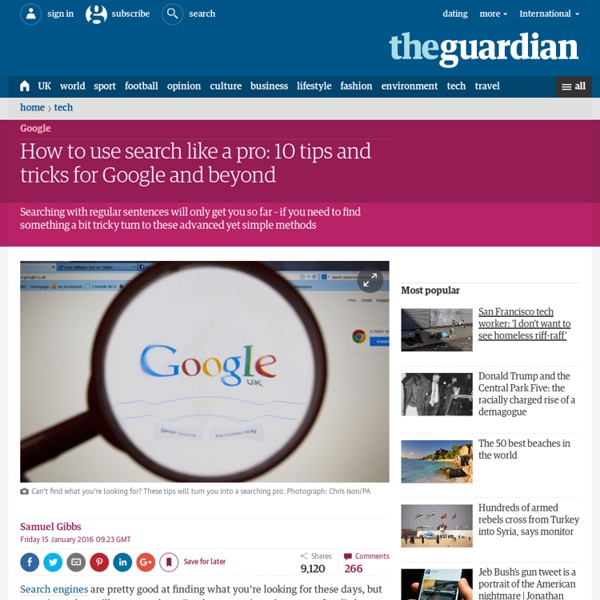10 Ways to Spot a Fake News Article - EasyBib Blog
For many of us, 2016 is going down as a year to forget. Election upsets, Zika, the Syrian crisis, and unfortunately tons of fake news about all of the above and everything in between. Denzel Washington was recently quoted as saying, “If you don’t read the newspaper, you’re uninformed. If you do read the newspaper, you’re misinformed.” So what should you do? You want to be informed, but a good deal of the information out there is incorrect or biased.
Lifehacker Guide - Chapter 8: Data To Go
To get things done today, you need the right information at your fingertips no matter where you are. You will travel, relocate, switch jobs, use more computers, and generate larger quantities of data in your lifetime than any previous generation has. The capability (or inability) to access that information on the go can make the difference between success and failure in work and life. Hack 68Manage Your Documents in a Web-Based Office Suite
Why We Lose Our Days To Unproductive Tasks
We have a range of exotic answers to the ever-burning question, how do we become more productive? Like by making your morning routine minimalist, turning your meetings into meals, and mastering the afternoon nap--though the secret to a most-productive day may be more simple: by ridding ourselves of unimportant tasks and replacing them with valuable ones. That's according to London Business School professor Julian Birkinshaw and PA Consulting Group productivity expert Jordan Cohen, who have spent three years researching how knowledge workers (mis)spend their time. As they say on HBR.org, a fear of missing out is keeping people mired: Our research indicates that knowledge workers spend a great deal of their time--an average of 41%--on discretionary activities that offer little personal satisfaction and could be handled competently by others. So why do they keep doing them?
How to Disagree Without Being Disagreeable: 7 Tips for Having More Productive...
George S. Patton once said: "If everyone is thinking alike, then somebody isn't thinking." In business, stirring the proverbial pot can be a good thing. And while negotiating these matters can be challenging -- especially when they involve our teammates or bosses -- differences in opinion will often lead to progress.
12 Principles Of Modern Learning
12 Principles Of Modern Learning by TeachThought Staff What are the principles of modern learning? Well, that depends on how you define ‘learning’ and what you’d consider ‘modern.’ Richard Olsen put together this useful visual way, way back in 2013–a chart that lays out three categories of a modern approach to learning–Modern, Self-Directed, and Social.
A Lovecraftian Bestiary
Azathoth “...that last amorphous blight of nethermost confusion which blasphemes and bubbles at the centre of all infinity—the boundless daemon-sultan Azathoth, whose name no lips dare speak aloud, and who gnaws hungrily in inconceivable, unlighted chambers beyond time amidst the muffled, maddening beating of vile drums and the thin, monotonous whine of accursed flutes; to which detestable pounding and piping dance slowly, awkwardly, and absurdly the gigantic ultimate gods, the blind, voiceless, tenebrous, mindless Other Gods whose soul and messenger is the crawling chaos Nyarlathotep.” (The Dream-Quest of Unknown Kadath)
The Single Best Time Management Tip Ever
Last Updated Apr 28, 2011 6:51 PM EDT I spent most of my life at war with time--and time usually won. I'd read every book and taken every course along the way, and with a few exceptions (like David Allen's excellent Getting Things Done), most of it seemed to rehash common sense. The feeling of being overwhelmed and underproductive was relentless. The big breakthrough came when I was first teaching at USC and a student with severe dyslexia asked for help. Not knowing what to do, I turned to an expert on learning disorders.
One-month sugar detox: A nutritionist explains how and why
But whether you've considered juicing, fasting or cleansing in an effort to lose weight or improve your well-being, you're probably aware that drastically cutting out foods is not effective as a long-term lifestyle approach to healthy eating. In fact, strict detoxing can cause issues including fatigue, dizziness and low blood sugar. But there is one kind of sustainable detox that is worthwhile, according to some experts. Reducing sugar in your diet can help you drop pounds, improve your health and even give you more radiant skin. "Sugar makes you fat, ugly and old," said Brooke Alpert, a registered dietitian and co-author of "The Sugar Detox: Lose the Sugar, Lose the Weight -- Look and Feel Great."
10 Benefits Of Inquiry-Based Learning
10 Benefits Of Inquiry-Based Learning by TeachThought Staff Inquiry-based learning is a term that educators and parents alike hear bandied about without a clear sense of exactly what it is, why it’s effective, how it works, and what its benefits are. For now, let’s define inquiry-based learning simply as an open-ended approach to learning guided by students through questions, research, and/or curiosity. Sketch-noter Sylvia Duckworth took Trevor MacKenzie’s ideas on the benefits on inquiry-based learning and put together the image above. We’ve linked to a few of our resources on some of the highlights below for extended learning and reflection.



